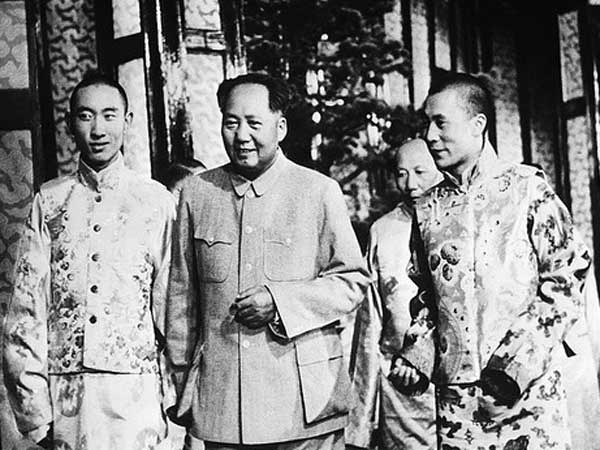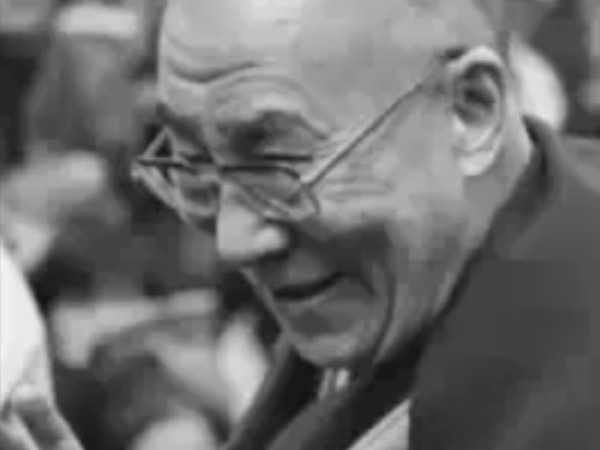DHARMA READINGS
| GURU DEVOTION BY LAMA ZOPA RINPOCHE | | Print | |
Page 1 of 2  Lama Zopa Rinpoche gave this teaching at Aryatara Institute, Germany, 7 April 2001. Every one of us has universal responsibility. If you have a good heart, loving kindness-compassion, then in your daily life, numberless living beings, including the people around you, animals, insects, in fact, all other living beings, do not receive harm from you. If you develop a good heart, loving kindness-compassion, not only do other sentient beings not receive harm from you, they also receive benefit and help. That absence of harm means peace and happiness in this life, happiness in all the coming future lives, and the ultimate benefit of bringing all sentient beings into total liberation from the entire ocean of samsaric sufferings by ceasing its cause, delusion and the karma. Readers' Comments
Not only that, but by having compassion, you benefit numberless other sentient beings by bringing them into great liberation, the non-abiding sorrowless state of full Enlightenment, which is total cessation of not only the gross, but even the subtle mistakes of mind, the subtle defilements; the subtle negative imprints left by the disturbing thought, the simultaneously-born ignorance, grasping at the I, the aggregates and all other phenomena as inherently existent, the subtle negative imprint that projects the hallucination, the dual view, of inherently-existent appearances. The cessation of all this is the great liberation. Thus, by developing compassion, you collect extensive merit, and through that you are also able to develop wisdom and cease all the defilements. In this way, you are able to bring all sentient beings into the peerless happiness of full Enlightenment. Thus, you can see how you can bring all these various levels of happiness to other sentient beings. So whether or not numberless sentient beings receive all this happiness from you is in your own hands; it depends upon what you do with your mind. It's up to what you do with your mind - whether you generate the good heart, loving kindness-compassion, towards all the sentient beings or not. Therefore, every one of us has complete responsibility for all the happiness of sentient beings from this life's temporary happiness up to that of full Enlightenment. Fulfilling this responsibility to bring happiness and benefit to other sentient beings is the purpose of your life, the reason you are alive. In order to liberate the numberless sentient beings from all their suffering and its cause, and bring them all happiness up to that of full Enlightenment; to accomplish such perfect work for all sentient beings, first you need to achieve full Enlightenment yourself. In order to be able to heal all the sicknesses of others, to give them the happiness of freedom from disease, you need to be a fully qualified doctor, knowing how to diagnose illness and what all the various treatments are. In the same way, then, to free others from all suffering and its cause and lead them to the peerless happiness of Enlightenment, first you need to become fully enlightened yourself. Of course, getting enlightened doesn't happen without cause you have to actualize the path to Enlightenment. Therefore, without creating the cause, completing the general path, you cannot achieve Enlightenment. Also, the path you actualize has to be an unmistaken path; if it's a mistaken path, you cannot achieve Enlightenment. Furthermore, you have to complete that unmistaken path. Just having a few realizations isn't enough for you to achieve Enlightenment. You have to complete all the realizations of the path to Enlightenment. Now, achieving full Enlightenment depends on actualizing the graduated path of the being of greatest capacity. That depends on actualizing, as a preliminary, the path of the being of intermediate capacity and the common graduated path. And that depends on actualizing, as a preliminary, the path of the being of lowest capacity and the common graduated path. Success from the beginning of the path - the graduated path shared in common with the being of least capacity, which starts with realization of the perfect human rebirth, this precious human body qualified by eight freedom and ten richnesses - all the way up to the end, Enlightenment, depends on the root of the path to Enlightenment, first analyzing prospective Gurus and, having found the right one, correctly devoting yourself to him through thought and action. In his commentary to the Fifty Verses of Guru Devotion, Lama Tsongkhapa explained the different qualities of the Guru according to the various teachings he quotes (see The Fulfillment of All Hopes, Wisdom Publications, 1999, p. 41 ff. See also Geshe Ngawang Dhargye's commentary.) According to one explanation, the Guru should [1] have stable devotion in the Mahayana teachings, [2] be learned in the different levels of the teachings; the Lesser Vehicle, Paramitayana and tantra[3] be skillful and wise in guiding disciples along the path to Enlightenment, [4] have strong compassion for others and [5] be subdued in his three doors of body, speech and mind. One set of five qualities is explained like that. Then, in his Mahayanasutralamkarakarika, Maitreya Buddha explained the ten qualities of a Mahayana Guru. The first three he mentioned were having his three doors [1] subdued, [2] pacified and [3] highly pacified. The first one means the higher training in morality; abstaining from vice, protecting himself from creating negative karma. The second one, pacified, means having controlled his mind, his disturbing thoughts, through having developed shamatha, the realization of calm abiding; in other words, having the higher training in concentration. The third one, highly pacified, means having the realization of great insight, emptiness; the higher training in wisdom. The fourth of the ten qualities is [4] having greater knowledge and higher qualities than the disciple. He should also [5] have perseverance and [6] his holy mind should be enriched with scriptural understanding and the lineage of the teachings. He should [7] have realized emptiness. Even though this realization has already been mentioned as the third quality, here it specifically means having the realization of emptiness according to the view of the Prasangika, the highest of the four schools of Buddhist philosophy. The previous mention of great insight meant the realization of emptiness according to any of the Buddhist schools; here it means specifically the Prasangika view. The remaining three qualities are [8] skill in explaining Dharma, [9] compassion for the students and [10] never feeling too discouraged or upset to explain Dharma, to guide and benefit the disciples. Anyway, if there's strong compassion, there's no way a mind feeling lazy or too tired to guide the disciples can arise. Also, as it is mentioned in the Guru Puja (Lama Chpa) and other texts, there are further qualities of the Guru who reveals the tantric teachings - the ten outer qualities of the Guru who teaches the lower tantras and the ten inner qualities of the Guru who teaches Highest Yoga Tantra. However, the very essence of all these qualities is that the Guru should emphasize cherishing others. If the Guru does not exhort the students to cherish others, it becomes an obstacle to their developing a good heart and actualizing bodhicitta, the realization required to enter the Mahayana path to Enlightenment. But if the Guru does not emphasize that, at least he should emphasize liberation from samsara, attainment of ultimate, everlasting happiness. And if not that, at the very least he should emphasize that the happiness of future lives is more important than the happiness this life. That is the very bottom line - it is more important to work for happiness of future lives than for the happiness of this life. If the teacher does not emphasize this, the disciples' attitude for practicing Dharma will not become Dharma. Whatever they do - meditation, retreat, any other activity - there's danger that they will waste their whole life. Whatever they do will not become Dharma, will not become virtue. Everything they do will be done with pure attachment, pure non-virtue, seeking only happiness of this life. Whatever the student does meditation, prayer, all twenty-four hours activities - becomes non-virtue, negative karma. That's the danger of having a Guru who does not teach the importance of working more for future lives than this. You can waste your entire life if your teacher doesn't emphasize detachment from the pleasures of this life and to work for long-run happiness, the happiness of all the coming future lives; not just one future life's happiness but that of all future lives. So, whether the teacher is ordained or lay, the very essence is who emphasizes these things, especially bodhicitta. In that way, the teacher is able to bring the disciple to Enlightenment. By emphasizing liberation from samsara, the teacher can bring the disciple to liberation. By emphasizing letting go of attachment, not clinging to this life, and emphasizing to work for happiness of all the coming future lives, the teacher allows the disciple to achieve happiness in future lives. This is how various teachers guide their disciples. The other fundamental quality that a teacher needs is to emphasize ethics, morality. In that way, the teacher is able to guide the disciple away from negative karma and protect the disciple from creating negative karma, the main obstacle to achieving Enlightenment, liberation from samsara and the happiness of future lives. It is important, therefore, at the beginning, before making a Dharma connection with a teacher, to analyze that person well. After thinking well, then establish a Dharma connection. The tantric teachings explain that in degenerate times such as these, it is difficult to find a teacher that has all the qualities as they are explained in the teachings. If that is so, still, your teacher should have eight of them, or five, or at least four. At least the teacher should possess the basic qualities that I mentioned before. This will help you avoid trouble in future, avoid creating very heavy negative karma, such as rising heresy, anger, many negative thoughts, and also, after having made a connection, giving up. Checking carefully will help you avoid all these dangers.
|
OTHER DHARMA READINGS
- A GUIDE TO SPIRITUAL PRACTICE
- DHARMA DEMYSTIFIED: NAGARJUNA, THE FOUNDER OF THE MAHAYANA TRADITION
- DORJE SHUGDEN ON BLACK HORSE
- WHY MANJUSHRI MATTERS
- DHARMA DEMYSTIFIED: THE ENTHRONEMENT OF DORJE SHUGDEN









